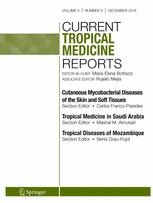Ver ítem
- xmlui.general.dspace_homeCentros e Institutos de InvestigaciónCICVyA. Centro de Investigación en Ciencias Veterinarias y AgronómicasInstituto de PatobiologíaArtículos científicosxmlui.ArtifactBrowser.ItemViewer.trail
- Inicio
- Centros e Institutos de Investigación
- CICVyA. Centro de Investigación en Ciencias Veterinarias y Agronómicas
- Instituto de Patobiología
- Artículos científicos
- Ver ítem
Human brucellosis and adverse pregnancy outcomes
Resumen
Purpose of Review Brucellosis is a neglected, zoonotic disease
of nearly worldwide distribution. Despite brucellosis being
recognized as a reproductive disease in animals, it has
been historically known as a flu-like illness in humans with
little or no significant role in maternal or newborn health. This
review focuses on what is currently known relative to the
epidemiology of brucellosis in human pregnancy as well as
new insights of placental
[ver mas...]
Purpose of Review Brucellosis is a neglected, zoonotic disease
of nearly worldwide distribution. Despite brucellosis being
recognized as a reproductive disease in animals, it has
been historically known as a flu-like illness in humans with
little or no significant role in maternal or newborn health. This
review focuses on what is currently known relative to the
epidemiology of brucellosis in human pregnancy as well as
new insights of placental immunology.
Recent Findings New evidence suggests that maternal infection
poses a significant risk factor for adverse pregnancy outcomes
including increased risk for miscarriage during the first
and second trimester of gestation, preterm delivery, and vertical
transmission to the fetus. Adverse pregnancy outcomes
were not associated with any specific clinical sign. However,
prompt diagnosis and treatment significantly decreased the
risk of miscarriage or any other adverse effect.
Summary Brucellosis during pregnancy should be considered
a significant risk factor for adverse pregnancy outcomes in
humans. The identification of the mechanism behind bacterial
tropism should prove powerful for the development of new
countermeasures to prevent these detrimental effects.
Increased awareness concerning brucellosis in pregnant women,
its transmission, and prevention measures should be considered
as a pressing need.
[Cerrar]

Autor
Arenas-Gamboa, Angela M.;
Rossetti, Carlos Alberto;
Chaki, Sankar P.;
Garcia-Gonzalez, Daniel G.;
Adams, Leslie G.;
Ficht, Thomas A.;
Fuente
Current tropical medicine reports 3 (4) : 164–172. (December 2016)
Fecha
2016-12
Editorial
Springer
ISSN
2196-3045 (Online)
Formato
pdf
Tipo de documento
artículo
Palabras Claves
Derechos de acceso
Restringido
 Excepto donde se diga explicitamente, este item se publica bajo la siguiente descripción: Creative Commons Attribution-NonCommercial-ShareAlike 2.5 Unported (CC BY-NC-SA 2.5)
Excepto donde se diga explicitamente, este item se publica bajo la siguiente descripción: Creative Commons Attribution-NonCommercial-ShareAlike 2.5 Unported (CC BY-NC-SA 2.5)

